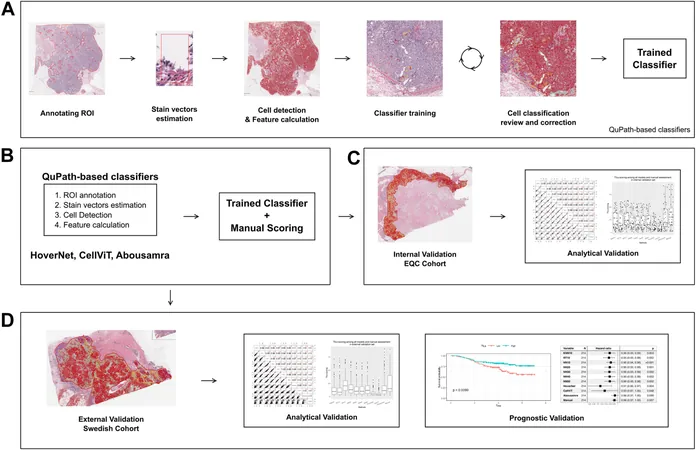
Breakthrough AI Study Reveals New Hope for Triple-Negative Breast Cancer Prognosis!
2024-11-18
Author: Siti
Karolinska Institutet's Groundbreaking Study
In a groundbreaking study, researchers at Karolinska Institutet have unveiled the potential of artificial intelligence (AI) to predict the prognosis of triple-negative breast cancer by meticulously analyzing immune cells within tumors. This innovative research, published in the reputable journal eClinicalMedicine, marks a significant stride towards incorporating AI into cancer care, potentially transforming patient outcomes for one of the most aggressive forms of breast cancer.
Role of Tumor-Infiltrating Lymphocytes
Tumor-infiltrating lymphocytes, a specialized type of immune cell, are crucial players in the body’s defense against cancer. Their presence within a tumor signals that the immune system is actively attempting to combat the malignancy. Understanding how these immune cells function in response to triple-negative breast cancer can provide essential insights into predicting how individual patients will react to treatments and how their disease may evolve.
Challenges in Analysis and AI's Solution
However, assessing these immune cells can be inconsistent when performed by pathologists, leading to variations in results. Enter artificial intelligence: this technology can standardize and streamline the analysis process, offering a more reliable assessment of immune responses. Yet, the challenge has always been proving that AI's capabilities are robust enough to be integrated into actual healthcare practices.
Evaluation of AI Models
In this landmark study, the researchers evaluated ten different AI models, scrutinizing their performance in analyzing tumor-infiltrating lymphocytes from tissue samples of triple-negative breast cancer patients. The findings revealed notable differences in analytical capabilities among the models. However, the good news is that eight out of the ten models demonstrated strong prognostic abilities, indicating they could reliably predict the future health of patients with a similar level of accuracy.
Insights from the Research
“We found that even models with limited training data delivered promising prognostic results, which reinforces the notion that tumor-infiltrating lymphocytes could serve as a reliable biomarker for assessing breast cancer prognosis,” explained Balazs Acs, a lead researcher at the Department of Oncology-Pathology at Karolinska Institutet.
Need for Further Research
Despite these encouraging results, the study underscores the necessity for larger datasets to facilitate comprehensive comparisons between various AI tools. Such validation is crucial to ensuring their effectiveness and reliability in clinical settings.
Conclusion and Future Outlook
As the quest for advanced cancer treatment techniques continues, this study highlights the powerful role AI could play in revolutionizing how we approach breast cancer prognosis. The findings inspire optimism for patients fighting triple-negative breast cancer, offering a glimpse of a future where precise and personalized healthcare is attainable. Stay tuned for more developments in the intersection of AI and cancer research!


 Brasil (PT)
Brasil (PT)
 Canada (EN)
Canada (EN)
 Chile (ES)
Chile (ES)
 España (ES)
España (ES)
 France (FR)
France (FR)
 Hong Kong (EN)
Hong Kong (EN)
 Italia (IT)
Italia (IT)
 日本 (JA)
日本 (JA)
 Magyarország (HU)
Magyarország (HU)
 Norge (NO)
Norge (NO)
 Polska (PL)
Polska (PL)
 Schweiz (DE)
Schweiz (DE)
 Singapore (EN)
Singapore (EN)
 Sverige (SV)
Sverige (SV)
 Suomi (FI)
Suomi (FI)
 Türkiye (TR)
Türkiye (TR)